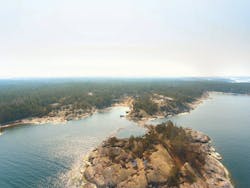Reverse Osmosis Systems & Remote Island Communities
About the author:
David Noble is head of communications for Bluewater. Noble can be reached at [email protected].
Extreme weather and heatwaves are increasing as the planet warms. From California to Australia to Africa and Europe, the consequences of temperature change are being felt everywhere around the planet. Climate change driven water scarcity even came close to achieving what Cold War Soviet threats failed to do by driving people off small Swedish island communities far out in the most northern reaches of the Baltic Sea archipelago outside Stockholm, the capital of Sweden.
Climate Change Threatens Swedish Islands
The archipelago is a sprawling cluster of around 30,000 islands and skerries cascading outwards towards Finland from Stockholm. Although the vast majority of the islands are uninhabited, around 200 of them have had thriving communities for hundreds of years with island-dwellers making a successful living from fishing, farming and tourism. Until now that is.
The archipelago islanders today face extreme water scarcity. The island aquifers that make human and animal life possible are drying out faster than they can replenish. During the past few years, the long Swedish winters have become dryer due to the warmer weather brought by changing climate, which mean less snow is falling to saturate the ground and penetrate as water into the underground aquifers. In addition, rainfall in the Stockholm archipelago also has decreased as a result of two unprecedented dry summers in succession that have brought record high temperatures and caused tinder dry conditions. As the Baltic island aquifers steadily dry out, they risk collapse, either entirely or partially, which leads to the freshwater in the aquifers being polluted by salty water from the Baltic Sea. Add the strain exerted on freshwater supplies by an ever increasing number of tourists, and the end result is a potential natural disaster.
As a side note, Sweden is not alone in suffering depleting aquifers. Research by NASA has indicated that 21 of the planet’s 37 major aquifer systems in the U.S., Asia and the Middle East are on the verge of collapse due to human pressure and climate changes. The World Health Organization also estimates that as early as 2025 half of the world’s population will be living in water-stressed areas. However, in Sweden, at least, there are solutions.
In a swords-to-ploughshares true life story, Bluewater, a Stockholm-based provider of residential, commercial and public water purification solutions, stepped in earlier this year to help a Swedish former heavy artillery battery built deep into the low granite cliffs on remote Arholma Island to harvest water directly from the Baltic Sea to create a self-sufficient holiday lodge and restaurant for nature lovers.
“Arholma’s two natural wells unexpectedly dried up completely in 2018 because of the climate change that has sparked shorter winters and dryer summers and threatened the viability of providing fresh drinking and washing water to tourists,” said Bluewater’s CEO Bengt Rittri.
Treating Water From the Baltic Sea
Bluewater was able to save the island as a tourist attraction by applying its compact second-generation reverse osmosis (RO) technology and engineering know-how to pump water directly from the Baltic Sea, purify it to remove everything from viruses and bacteria to chemicals and micro-plastics, and serve back to the public as drinking or shower water.
Just 5 kilometers long and 2 kilometers wide, Arholma is the northernmost island in the Stockholm archipelago. Comprising mostly craggy rocks and old farmland, Arholma’s main claim to fame, apart from its unique island natural environment, is the once top-secret heavy artillery battery built deep into the rocks during the cold war in the 1960s to protect Sweden from a Soviet-led invasion. No enemy forces ever turned up, and finally, the Swedish military decided to shut down the military garrison of 340 soldiers.
For awhile, the gun emplacements, kitchens, barracks and medical quarters stood empty. Then, three years ago, the local authorities decided to put the facilities to better use, creating overnight lodgings and a restaurant for nature lovers between early June and mid-September, as well as conference facilities for those looking for an unusual setting.
The water generating system, used to meet all the hydration and bathing needs of staff and visitors alike, incorporates three compact Bluewater Pro 600 water purifiers, each able to generate up to 7,000 liters per day of clean water. The Pro purifier units, which are a little larger than a traditional computer tower, utilize a Bluewater-patented technology called SuperiorOsmosis that constantly washes the unit’s contaminant-removing membrane. This helps ensure greater water-scrubbing efficiency as well as reducing energy consumption and increasing the life of the entire filtration system.
Additionally, the water generation systems leverage new advances in connectivity being applied by Bluewater to fault find, pre-empt late filter changes and check ongoing water quality. Plans also are underway to offer solar- and wind-powered versions of the purification systems to further enhance their usefulness and green credentials.
“The Arholma facility is the first of its kind to give a chance of survival to remote island communities that can no longer rely on having unfettered access to fresh water, and we are doing in a way that is completely sustainable by taking water directly from the brackish Baltic Sea,” Rittri said.
